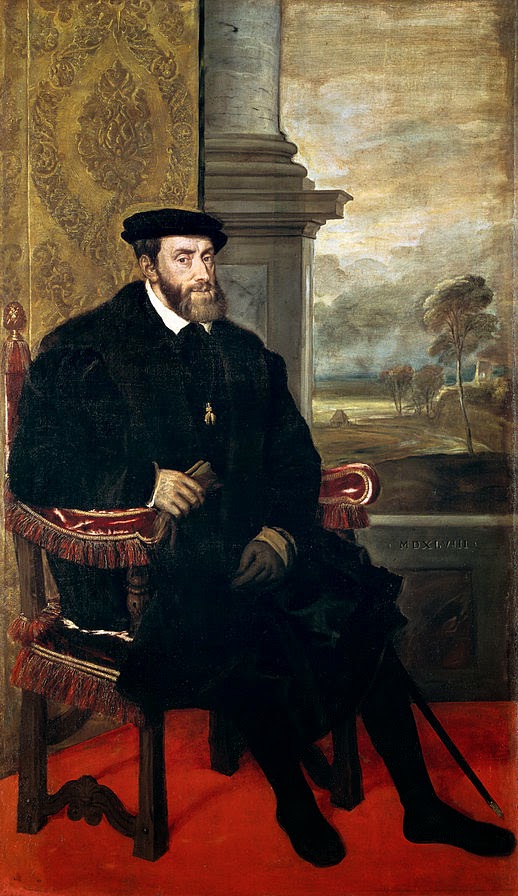Introduction to our series The Peace of Augsburg and the Abdication of Charles V:
The Peace of Augsburg did not end the wars of the Protestant Reformation but it established a framework for how the Catholic and Protestant powers would co-exist. And now, William Robertson.
Time: 1555
Place: Augsburg, Germany
 |
| Charles V by Titian and his colleague Lambert Sustris. cc Wikipedia |
This speech being printed in common form, and dispersed over the empire, revived the fears and jealousies of the Protestants; Ferdinand, they observed with much surprise, had not once mentioned, in his address to the Diet, the Treaty of Passau, the stipulations of which they considered as the great security of their religious liberty. The suspicions to which this gave rise were confirmed by the accounts which were daily received of the extreme severity with which Ferdinand treated their Protestant brethren in his hereditary dominions; and as it was natural to consider his actions as the surest indication of his intentions, this diminished their confidence in those pompous professions of moderation, and of zeal for the reëstablishment of concord, to which his practice seemed to be so repugnant.
The arrival of the cardinal, Morone, whom the Pope had appointed to attend the Diet as his nuncio, completed their conviction, and left them no room to doubt that some dangerous machination was forming against the peace or safety of the Protestant Church. Julius, elated with the unexpected return of the English nation from apostasy, began to flatter himself that, the spirit of mutiny and revolt having now spent its force, the happy period was come when the Church might resume its ancient authority, and be obeyed by the people with the same tame submission as formerly. Full of these hopes, he had sent Morone to Augsburg with instructions to employ his eloquence to excite the Germans to imitate the laudable example of the English, and his political address in order to prevent any decree of the Diet to the detriment of the Catholic faith. But Julius died, and as soon as Morone heard of this he set out abruptly from Augsburg, where he had resided only a few days, that he might be present at the election of the new pontiff.
One cause of their suspicions and fears being thus removed, the Protestants soon became sensible that their conjectures concerning Ferdinand's intentions, however specious, were ill-founded, and that he had no thoughts of violating the articles favorable to them in the Treaty of Passau. Charles, from the time that Maurice had defeated all his schemes in the empire, and overturned the great system of religious and civil despotism which he had almost established there, gave little attention to the internal government of Germany, and permitted his brother to pursue whatever measures he judged most salutary and expedient. Ferdinand, less ambitious and enterprising than the Emperor, instead of resuming a plan which he, with power and resources so far superior, had failed of accomplishing, endeavored to attach the princes of the empire to his family by an administration uniformly moderate and equitable. To this he gave, at present, particular attention, because his situation at this juncture rendered it necessary to court their favor and support with more than usual assiduity.
Charles had again resumed his favorite project of acquiring the imperial crown for his son Philip, the prosecution of which, the reception it had met with when first proposed had obliged him to suspend, but had not induced him to relinquish. This led him warmly to renew his request to his brother, that he would accept of some compensation for his prior right of succession, and sacrifice that to the grandeur of the house of Austria. Ferdinand, who was as little disposed as formerly to give such an extraordinary proof of self-denial, being sensible that, in order to defeat this scheme, not only the most inflexible firmness on his part, but a vigorous declaration from the princes of the empire in behalf of his title, were requisite, was willing to purchase their favor by gratifying them in every point that they deemed interesting or essential.
Continued on Sunday, October 26th.
More information here.
No comments:
Post a Comment